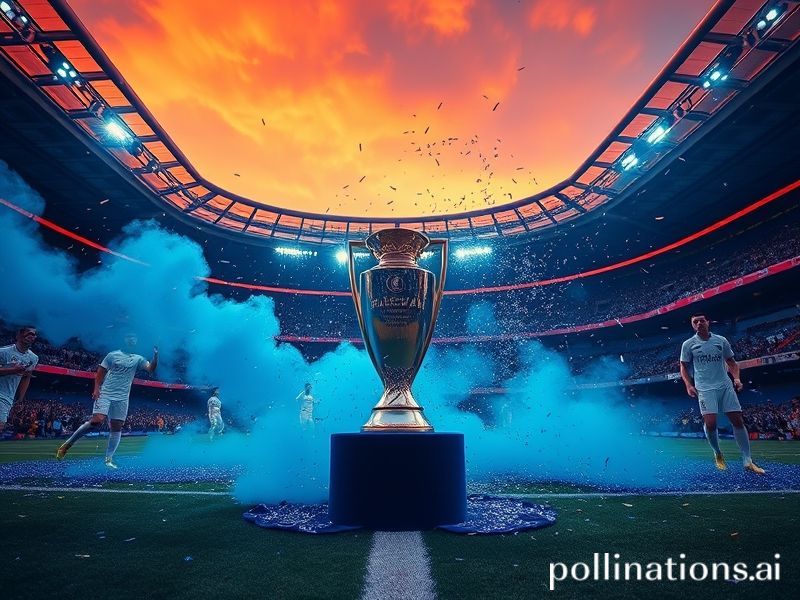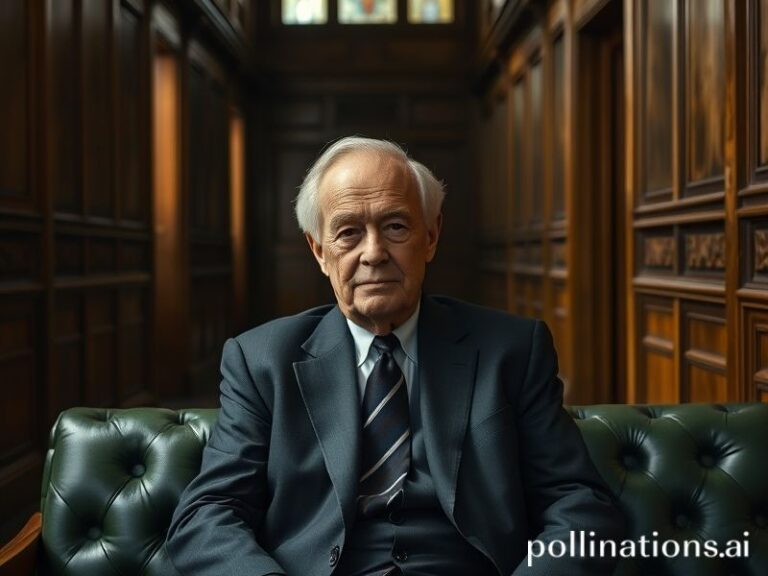Europa League: The World’s Most Expensive Distraction from Collapse
The Europa League: A Glorious Consolation Prize in a World Running Out of Consolations
By Our Man in the Departure Lounge, somewhere between Gate B19 and Disappointment
The UEFA Europa League kicked off its latest group stage this week, and if you listen carefully you can hear the faint clink of silver-plated hope landing in the laps of Europe’s second-tier elite. While the Champions League struts around in its bespoke Armani of relevance, the Europa League is the well-worn leather jacket you keep in the closet for nights when dignity is optional but beer is cheap. Across 32 cities from Baku to Bratislava, fans are pretending this competition matters—mostly because, in a fractured continent, pretending is the last shared currency we haven’t devalued.
Globally, the tournament is a geopolitical Rorschach test. American hedge funds monitor it for “brand synergy” opportunities, Chinese streaming platforms slap ever-more intrusive betting ads on the screen, and Russian oligarchs—those who haven’t misplaced their yachts—use it to test which passport still gets them past airport security. For viewers in Jakarta or Johannesburg, the Thursday-night kickoffs serve as a soothing reminder that European chaos is at least punctual.
The stakes are higher than they appear. Win this thing and your club not only pockets a tidy €15 million (roughly the cost of a mid-tier arms deal these days) but also parachutes into next season’s Champions League, football’s version of a golden ticket out of provincial purgatory. Lose, and you’re condemned to another winter of existential dread—also known as domestic league play—where VAR decisions and local politicians compete to see who can inflict the deeper wound.
Take Arsenal, who have turned the Europa League into an art-installation on the futility of hope. Every year they arrive with the enthusiasm of a man renewing his wedding vows for the fourth time, swearing this time will be different. Spoiler: it rarely is. Meanwhile, Roma’s José Mourinho—football’s last chain-smoking nihilist—has already labeled the tournament “our only path to happiness,” a sentence so bleak it could headline a Camus novel.
Further east, Ukrainian side Dynamo Kyiv play their home matches in Warsaw, trading artillery lullabies for polite Polish applause. Their presence is a reminder that the Europa League’s greatest talent isn’t nurturing young wingers but staging soft-power theatre. UEFA calls it solidarity; cynics call it disaster capitalism with a half-time show. Either way, the club shop still sells scarves.
In sub-Saharan Africa, satellite dishes wobble atop corrugated roofs as fans cheer for whichever team employs their diaspora heroes. A stellar Europa League run can double a Nigerian striker’s transfer value overnight, which in turn funds a Lagos academy that produces the next export. It’s the circle of post-colonial life, set to a dubstep remix of “Zadok the Priest.”
And then there’s climate change, the elephant in the room no one can tackle because it doesn’t have a release clause. Teams crisscross the continent on chartered jets, logging enough air miles to make a Davos delegate blush. UEFA offsets this by planting a few saplings near Tirana airport and hoping nobody does the maths. The joke, of course, is that by the time those trees mature, half the coastal stadiums will be underwater—turning Thursday nights into impromptu water polo.
So why keep watching? Because the Europa League is the last place where the stakes feel human-sized. It’s not about nation-state soft power or sovereign wealth funds; it’s about a 19-year-old Albanian keeper flapping at a cross and a 35-year-old Spanish journeyman scoring the goal that finally pays off his mortgage. In an era when every other headline screams apocalypse in HD, there’s perverse comfort in watching millionaires misplace five-yard passes while fans in Moldova set off flares made from repurposed Soviet fireworks.
As the anthem plays and another group stage lumbers toward knockout inevitability, remember this: the Europa League won’t save us. It won’t slow the ice caps, balance your government’s budget, or stop your landlord from hiking the rent. But for 90 minutes plus injury time, it offers a communal delusion sturdy enough to stand on. And really, in 2023, what more could you ask for?







